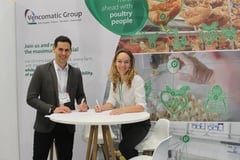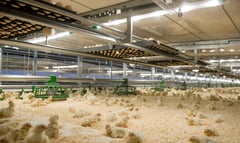"My uncle had a shed with 300 chickens 50 years ago, he just threw in his leftovers. Nowadays there are 15,000 laying hens in the smallest house, but not a farmer who throws food leftovers in there."
Wim Peters is a poultry specialist at Vencomatic Group, he has had many questions from farmers about chickens. Including the question if chickens eat everything. Wim is very firm about this, farmers don't take risks with feed: "They are far too afraid of salmonella infections, food safety has the highest priority".
Do chickens really like everything?
"They do a lot. A chicken is an omnivore, they eat both vegetable and animal food: piers, for example, and turrets. At a petting zoo they also get bread, which is made from grain, so they like it. But they also like apples. Pigs, however, are the real omnivores, they often get waste products. With chickens this is hardly ever done, especially to prevent salmonella infection. You have to have a new installation for new chicken feed and a new silo, but that's not the case with pigs.”
"As a rule, therefore, chicken farmers only buy feed from a feed factory, which contains all the nutrients. In recent years they have also started to pay more and more attention to pathogenic organisms in the feed, such as salmonella. A farmer has to take a sample of each feed delivery and store it in case something turns out to be wrong later on. That’s called tracking and tracing, isn't it?”
So chickens are not fed extra?
"Chickens are generally not given supplementary feed, unless they consciously want to increase the chance of mating in broiler parent animals. After all, a hatching egg must be fertilized, otherwise it is worthless. Often farmers then give special ‘scratch feed’ in the form of broken grain or broken corn, which you throw into the litter room, luring the hens and therefore also the roosters. If the hens stay on the grid, they will not be 'entered' by the roosters and nothing will be fertilized".
"With broilers you often see exceptions to the rule. For example, if farmers grow grain themselves, they naturally want to reduce feed costs. But then they need a separate installation with their own grain, which mixes it with the regular feed. I've been to a farmer in the Netherlands once who did that.”
"What not many people know: food determines the taste of the egg. In a store, you often see as many as ten different kinds of eggs, for example from free range. The difference in taste, however, is not in the housing system but in the food. A grain egg tastes different because the laying hen has had different food. There are people who swear by free-range eggs, but I think that's mainly because they feel less guilty about it. The taste is the same.”







